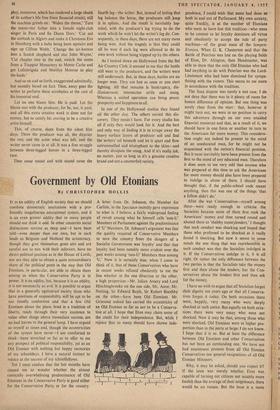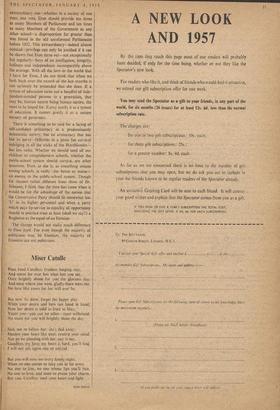Government by Old Etonians
By CHRISTOPHER HOLLIS IT is an oddity of English society that we should combine democratic institutions with a pro- foundly inegalitarian educational system, and it is an even greater oddity that so many people should not think it odd. In other countries social distinctions survive as deep and—I have been told—even deeper than our own, but in such lands as Belgium and Holland the aristocracy, though they give themselves great airs and are careful not to mix with their inferiors, have no direct political position as irt the House of Lords, nor are they able to obtain a quite extraordinary share of the political posts in the way that Old Etonians, in particular, are able to obtain them among us when the Conservative Party is in power. It is an oddity, but, because it is an oddity, it is not necessarily an evil. It is possible to argue that in a generally egalitarian society those who have positions of responsibility will be apt to be too timidly conformist and that a few Old Etonians about the place, bred in a tradition of liberty, ready through their very insolence to value other things above immediate success, are no bad leaven to the general lump. I have argued so myself at times and, though the eccentricities of the system have never—I am comforted to think—been stretched so far as to offer to me any prospect of political responsibility, yet as an Old Etonian with nothing but happy memories of my schooldays. I have a natural instinct to rejoice at the success of my schoolfellows.
Yet I must confess that the last months have caused me to wonder whether the almost comically overwhelming predominance of Old Etonians in the Conservative Party is good either for the Conservative Party or for the country. A letter from Dr. Johnson, the Member for Carlisle, in the Spectator recently gave expression to what is, I believe, a fairly widespread feeling of revolt among what he himself calls `non-U' Members of Parliament against the predominance of 'U' Members. Dr. Johnson's argument was that the quality required of Conservative Members to save the country from the dangers of a Socialist Government was 'loyalty' and that that loyalty had been notably more evident over the past weeks among `non-U' Members than among 'U.' Now it is certainly true, when I come to think of it, that of those Conservatives who have in recent weeks refused obediently to toe the line whether in the one direction or the other, a high proportion—Mr. Julian Amery and Lord Hinchingbrooke on the one side, Mr. Astor, Mr. Nutting, Sir Edward Boyle, Sir Robert Boothby on the other—have been Old Etonians. Mr. Grimond indeed has carried the eccentricity of an Old Etonian so far as not to be a Conserva- tive at all. I hope that Eton may claim some of the credit for their independence. But, while 1 rejoice that so many should have shown inde- pendence, I could wish that more had done so both in and out of Parliament. My own anxiety, quite frankly, is at the number of Etonians who seem to have lost this tradition--1-who seem to be content to let loyalty dominate all virtue and obediently to accept the rule of party machines—of the great mass of the lumpen- Etonien. When G. K. Chesterton said that the Battle of Peterloo was lost on the playing fields of Eton, Dr. Alington, then Headmaster, was able to show that the only Old Etonian who had had anything to do with Peterloo was the Lord- Lieutenant who had been dismissed for sympa- thising with the rioters. This seems to me more in accordance with the tradition.
The Suez dispute was surely a test case. I do not deny that there was in it plenty of room for honest difference of opinion. But one thing was surely clear from the start : that, however it might turn out, we were in no position to carry this adventure through on our own unaided financial resources and that, as a result of it, we should have in one form or another to turn to the Americans for more money. This considera- tion might not indeed be present to the mind of an uneducated man, for he might not be acquainted with the nation's financial position. But it must inevitably have been present from the first to the mind of any educated man. Therefore it does seem to me very odd that anyone who was prepared at this time to ask the Americans for more money should also have been prepared to indulge in abuse of them. I should have thought that, if the public-school code meant anything, then this was one of the things 'that a fellow didn't do.'
After the war Conservatives—myself among them—were ready enough to criticise the Socialists because some of them first took the Americans' money and then turned round and abused them as 'shabby moneylenders.' I thought that such conduct was shocking and hoped that those who professed to be shocked at it really found it shocking. But now it seems to some minds the one thing that was reprehensible in such conduct was that the Socialists indulged in it. If the Conservatives indulge in it, it is all right. Or rather the only difference between the two parties is that the Socialists take the money first and then abuse the lenders, but the Con- servatives abuse the lenders first and then ask for the money.
I have no wish to argue that all Socialists forgot their dignity ten years ago or that all Conserva- tives forgot it today. On both occasions there were, happily, very many who were deeply shocked at such antics. But equally on both occa- sions there were very many who were not shocked. Now it may be that, among those who were shocked, Old Etonians were in higher pro- portion than in the party at large. I do not know. I hope that it is so. But at least the difference between Old Etonians and other Conservatives has not been an outstanding one. We have not had unanimous protests from all Old Etonian Conservatives nor general resignations of all Old Etonian Ministers.
Why, it may be asked, should you expect it? If the issue was merely whether Eton was capable of turning out citizens not notably more foolish than the average of their neighbours, there would be no reason. But the issue is a more extraordinary one--whether in a society of one man, one vote, Eton should provide ten times as many Members of Parliament and ten times as many Members of the Government as any other school—a disproportion far greater than was found in the old unreformed Parliaments before 1832. This extraordinary—indeed almost comical—privilege can only be justified if it can be shown that Eton turns out—not exceptionally but regularly—boys of an intelligence, integrity, holiness and independence incomparably. above the average. With all the love in the world that I have for Eton,. I do not think that When we look back over the record of the last months it can seriously be pretended that she does. If a system of education turns out a handful of inde- pendent-minded persons in a generation, that may be, human nature being human nature, the most to be hoped for. lt,may justify it as a system of education. It cannot justify it as a unique nursery of governors.
There is something to be said for a lacing of self-confident aristocracy in a predominantly democratic society, but an aristocracy that has lost its nerve --Hillerists in a panic for survival indulging in all the tricks of the Hornblowers-:– has less value. Whether we should send all our children to comprehensive schools, whether the public-school system should survive, arc other questions. Eton, as she is, as something unique among schools. is really—for better or worse-- an enemy. to the public-school system. Though for reasons rather different from those of Dr. Johnson, I think that the time has come when it would be for the advantage of the nation that the Conservative Party should lie somewhat less 'U' in its higher personnel and when a party which pays lip-service to equality of opportunity should in practice treat at least (shall we say?) a Rugbeian as the equal of an Etonian.
The change would not make much difference to Eton itself. For even though the majority of politicians may be Etonians, the majority of Ltonians are not politicians.















































 Previous page
Previous page